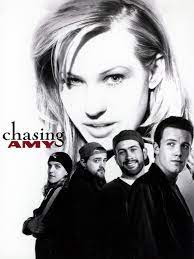Director: Kevin Smith
Country of origin and year of release: US, 1997
An interesting take on stereotypes and expectations around sexual identities, Chasing Amy is the third in Kevin Smith's 'New Jersey Trilogy', following on from Clerks and Mallrats. This means that there are a number of scenes and bits of dialogue that acknowledge the events of the earlier films (for example, the line 'My best friend fucked a dead guy in the bathroom!' makes no sense without the viewer having first seen Clerks...) and Jay and Silent Bob feature in the films cast of characters, albeit to a much lesser extent than in the previous two films.
Set in the world of indie comix creation and conventions, our central protagonist is Holden McNeil (Ben Affleck), co-creater of the comic Bluntman and Chronic alongside his childhood friend Banky Edwards (Jason Lee). At a convention, they meet Alyssa Jones (Joey Lauren Adams), creator of Idiosyncratic Routine, who happens to be sharing a panel with their friend Hooper (Dwight Ewell), a black comic creator whose work taps into the legacy of Malcolm X and the Black Panthers. Holden is quickly attracted to Alyssa, and is excited to have the opportunity to meet up with her again (alongside Banky and Hooper) a few days later at a club. Where he finds out that she is a lesbian.
The central conceit of a straight man falling in love with a lesbian is reputed to have come from Guinevere Turner and Rose Troche's film Go Fish, in which one of the lesbian characters sleeps with a man and is then tortured by thoughts of how her community will judge her if they find out. Turner has a cameo in Chasing Amy in the nightclub scene, where she plays Alyssa's former bandmate, who persuades her to take to the stage and perform a song with the band.
While filled with Smith's usual directorial motifs, Chasing Amy is markedly different from its two predecessors, mainly because of the subject matter. If Holden and Alyssa's identities were the only ones being put under the microscope, the film wouldn't work. It is Hooper and Alyssa, the two non heterosexual characters, who seen to have the greatest self awareness and understanding of themselves and the identities they have constructed around themselves. As a highly politicised black male comic writer, Hooper is fully aware of the extent to which he suppresses his gay identity for the sake of his brand. Similarly, Alyssa knows exactly who she is, and what she wants. Holden and (especially) Banky seem rather more conflicted about their own professional and personal identities and the ways in which their relationship changes following Holden's attraction to Alyssa is at least as much of a theme of the film as Holden's relationship with Alyssa is.
This isn't just a film about sexual identities, or even rejection from communities, it's also very much a film about male fragility. Because the film was made at the tail end of the short lived cultural trend 'lesbian chic', there's also a sly flipping of the male gaze at one point. What might surprise Smith's fans is how brutal the second half of the film is, especially the ending, and this might explain why it's the least well known of the three Jersey films. It's certainly a far cry from the slapstick of Mallrats, though it does give the first indication that Smith was about to develop new themes and trends as a film maker, with his fourth film Dogma showing that he was still prepared to find humour in heavy topics.
Chasing Amy is definitely not one of Smith's most well known, or lauded, films but it's a film that has endured to a greater degree than you would expect and there are moments that are as shocking today as they were in 1997. It's a film that bears re-watching too.

No comments:
Post a Comment